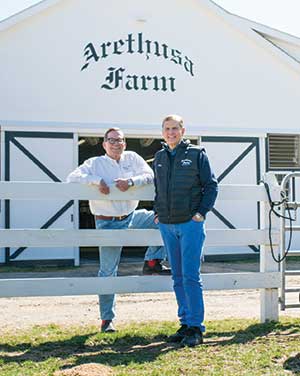Main Street Business

Milk Like it Used to Taste
Have you ever wondered how the partners of Manolo Blahnik’s American shoe business, popularized on the TV show “Sex and the City,” started a farm in Litchfield, CT, producing dairy products available through out New England? George Malkemus made time to talk to Main Street Magazine from his office in New York and then from Arethusa Farm in Litchfield, CT. It’s a passionate, surprising story.
How did two Manolo Blahnik executives become dairy farmers?
In 1977, my partner, Tony Yurgaitis, and I bought our first country house in Woodbury, CT, and then in 1988 we purchased a bigger house in the Town of Litchfield with views of an equestrian farm. The horse property was eventually put up for sale and the offer from a buyer who wanted to make it into a golf course fell through because of financing. A golf course would have completely changed the terrain, especially in the winter when the greenery is gone. Next a real estate developer started looking at it. That’s when we decided to buy it in 1999. We had no idea of what we were going to do with it except preserve the farmland and our view.
The farm is named after the rare Arethusa orchid that grows in the wet lowlands of the farm.
 We started reading and researching and discovered that the property had originally been a dairy farm 100 years ago. As we became aware of the desperate situation of farmers and the story behind abandoned farms, we became passionate about preserving agricultural land and bought the adjoining farm as well. We started out with five cows, gradually expanded the herd and learned about running a dairy farm. Initially we were selling our milk wholesale to a cooperative as most farmers do. In 2008, we were only getting $0.88 a gallon. That’s when we decided to process our own milk.
We started reading and researching and discovered that the property had originally been a dairy farm 100 years ago. As we became aware of the desperate situation of farmers and the story behind abandoned farms, we became passionate about preserving agricultural land and bought the adjoining farm as well. We started out with five cows, gradually expanded the herd and learned about running a dairy farm. Initially we were selling our milk wholesale to a cooperative as most farmers do. In 2008, we were only getting $0.88 a gallon. That’s when we decided to process our own milk.
We rented an old dairy in Bolton, CT, that had its own bottling facility and immediately improved our price per gallon. Within six months we bought an old firehouse in Bantam and converted it into our own bottling/processing plant. By 2014 we had added a dairy store in Bantam and then we opened Al Tavolo, a fine dining new American cuisine restaurant. Arethusa a mano, a café/bakery, in Bantam was next. Then came the dairy store in New Haven. Our latest venture is a combination of café, restaurant, and dairy/ice cream shop in West Hartford. We ship freshly baked goods from Bantam to West Hartford every morning at 4am. Despite resistance from our team we’re making bagels. They thought no one liked bagels in northwest Connecticut, but I had a gut feeling and installed a $70,000 bagel boiler at our bakery. The very first weekend we sold 1,100 bagels!
Despite Covid the store is doing very well and we may expand the concept to Fairfield and Westport. Every week I spend time talking to customers, it’s what I do for a living. We’re really focusing right now on customer service.
How did you learn about dairy farming?
I grew up in San Antonio, TX. From the age of 12 I worked summers at my uncle’s ranch and peanut farm in a small town near by. Every morning I milked the only cow and our family and field hands had fresh milk for our breakfast. I’ll always remember the taste of that milk. It’s where our tagline, “Milk like it used to be” came from. When we started Arethusa we had no idea of what we were doing and we made a lot of mistakes. One big one was hiring a consultant who convinced us to buy expensive show cows. Finally we went to the World Dairy Expo in Madison, WI, where the greatest farmers in the world gather and show their cows. We recruited a dairy farmer manager and crews from the Midwest, upstate New York, and Pennsylvania. They all love the unique idea of Arethusa and working with the world’s best cows.
How big is this enterprise? How many cows?
We have 300 acres and about 350 well-cared for cows. They are brushed every day and milked at 4am and 4pm. In between milkings, after resting, they are brushed and walked to their fields. All our barns are set up so the cows can go in and out. Cows don’t mind hot weather as long as there’s water and they also do well in cold weather. You just have to watch out for ice.
Nationally, in commercial dairy operations, cows never leave the barn and have a life span of only three to five years. When they stop producing milk, many are slaughtered for meat. Here we are a no kill operation and when a cow no longer has milk, she retires to the barn up on top of the hill with the best view of the farm. Some friends have said that in their next life they’d like to be an Arethusa cow. When bulls are born we sell them to the Amish to be used as oxen.
What cow breeds do you have? Is the milk organic?
The farm has three different breeds. Our products are a blend of the high fat content produced from Jerseys, the high protein from the Holsteins, and the balanced milk of the Brown Swiss. Our whole milk is almost 4% fat.
We have not sought an organic designation because it means that cows have never been treated with antibiotics. At Arethusa when a cow has an infection we do treat them with antibiotics rather than letting them suffer and die. The sick cow is separated from the herd and the milk is thrown out until the antibiotics are no longer present and the animal has recovered.
How wide is your distribution? Was it hard to get shelf space?
We’re too small to pay for shelf space. We encourage stores to visit our farm and try our product. If customers like it they buy from us. Right now we have about 65 to 70 stores in New England that carry Arethusa with a growing business in Boston, New York City, and Pennsylvania.
How many employees do you have? Are they hard to find? How do you keep them safe?
We have around 165 employees and I’m really proud that we are giving so many local Connecticut people employment in agriculture. Lots of people apply because they want to work here. Usually we start them as interns to see how they work out. We’re very involved with scholarships at UCONN and find employees on their bulletin boards.
We’ve been strict about following safety practices and all employees wear masks. In general, farmers have been socially distancing for years. The whole corona virus has been brutal for farmers who lost their restaurant, school, and institutional customers. They had to throw out milk because there was no demand. Some ended up selling their cows for $500 or $600 for meat. Do you know how badly it hurts a farmer who has raised a cow to lose her?
Any suggestions for someone who wants to become a farmer?
You should go work on a well-run farm in the summer and in the winter to learn. You must have a passion for the work.
Did the local community of farmers welcome a gay couple?
You’d be surprised how many gay farmers there are. Farmers accept those who are serious about the farming business. We feel very welcomed. A new initiative of ours is to assist local dairy farmers get better prices for their milk. Currently we are working with three farms. They must agree to follow our standards for caring for the cows, milking, etc., and, if after a trial period they comply, we send our trucks to pick up their milk and pay them much better than the co-op does.
What’s your favorite ice cream flavor?
Arethusa makes the best strawberry ice cream with our own special mix. That’s my favorite.
How would you characterize your management style?
Strong work ethic, go with your gut and passion is our style. We are also meticulous. Everything we do is basically from passion. We have no five-year plan. We’re not like that. The biggest problem farmers, or any business has, is being undercapitalized. Lack of a financial cushion can be tragic for a small business.
What’s the favorite part of your day at the farm?
At the end of the day Tony and I hop in the Gator with our two Scottish Terriers and drive around the property, looking over the fields to our house. There’s just an enormous satisfaction in having created all of this. My least favorite part of any day is paying the bills. •
To learn more about Arethusa Farm and their operation, visit them online at www.arethusafarm.com.



